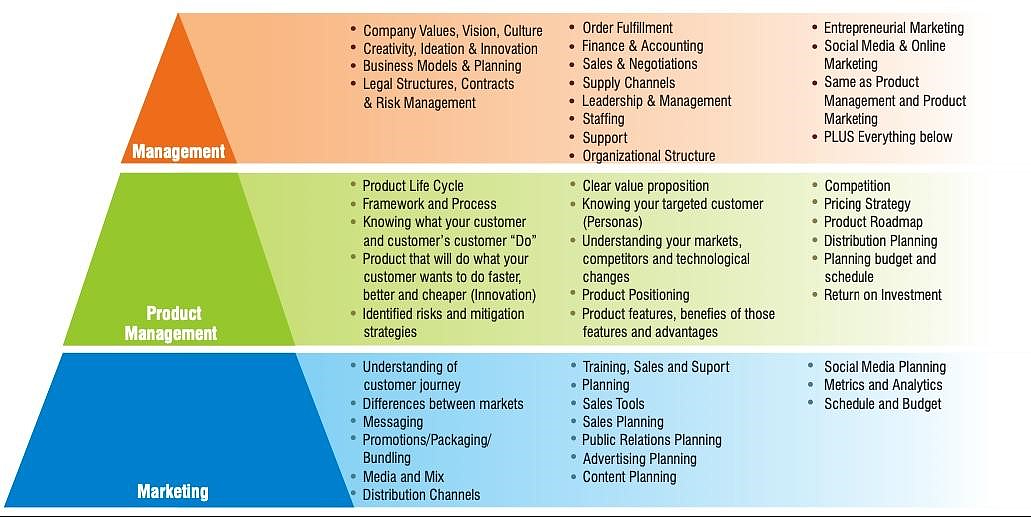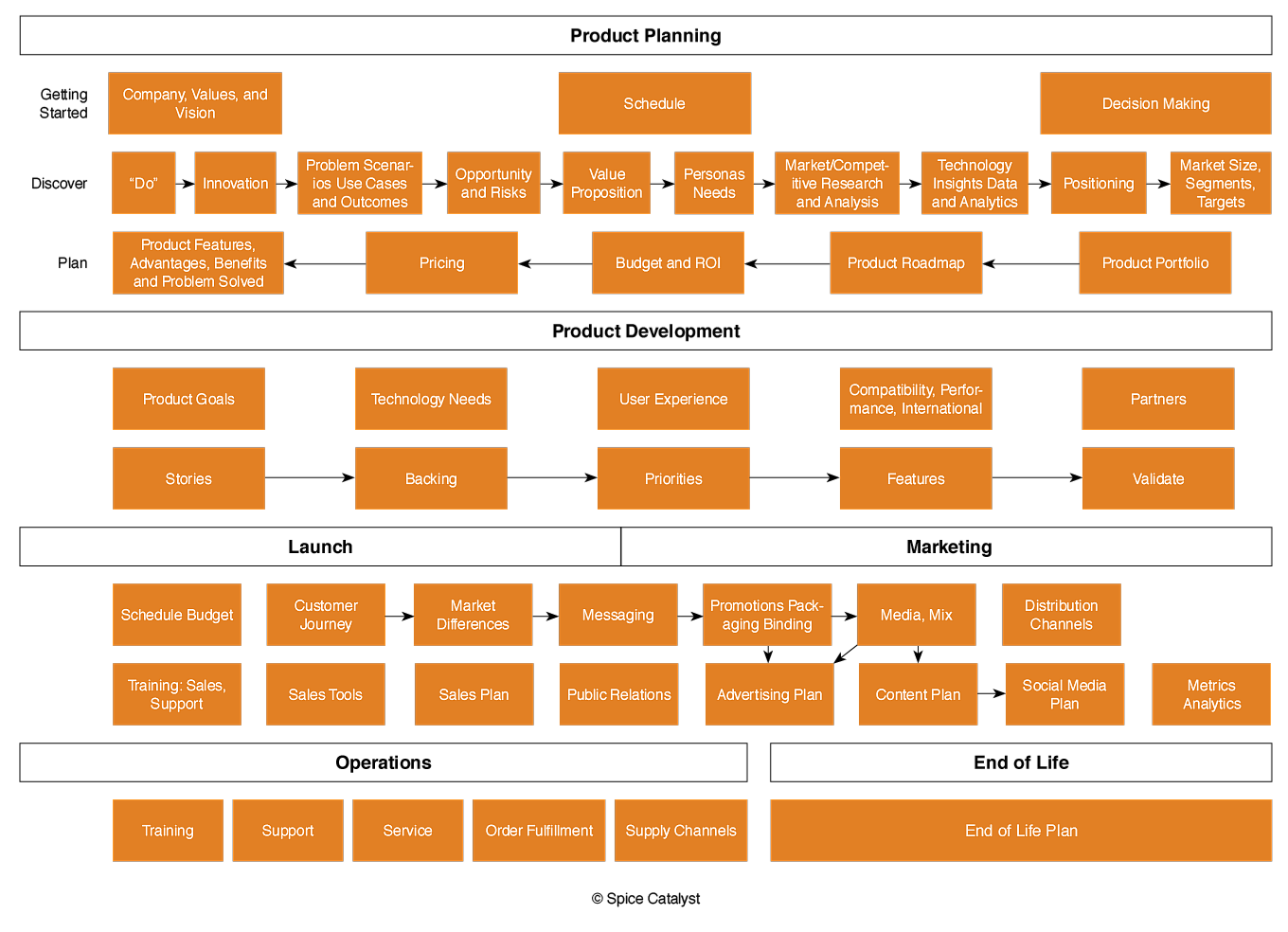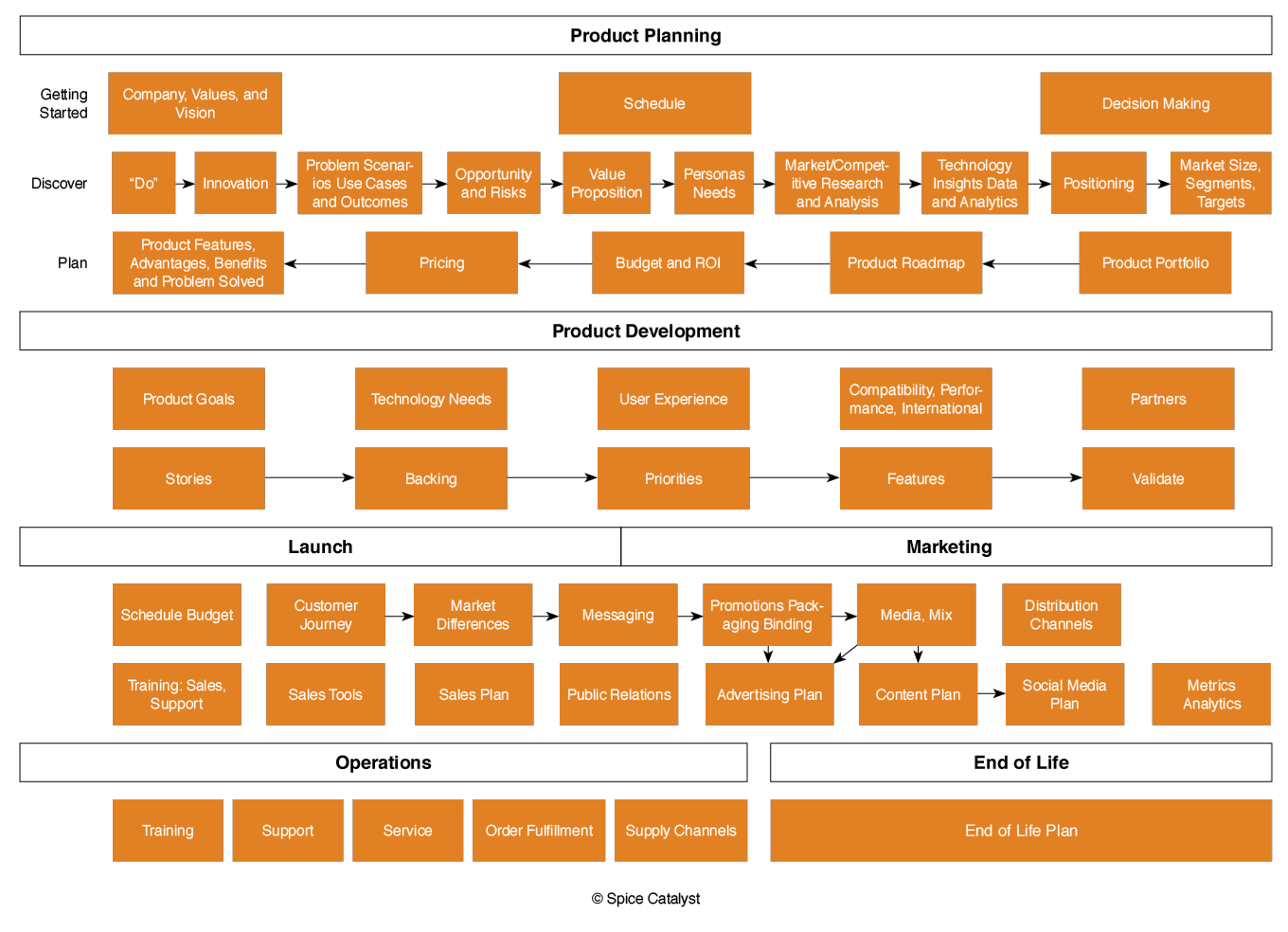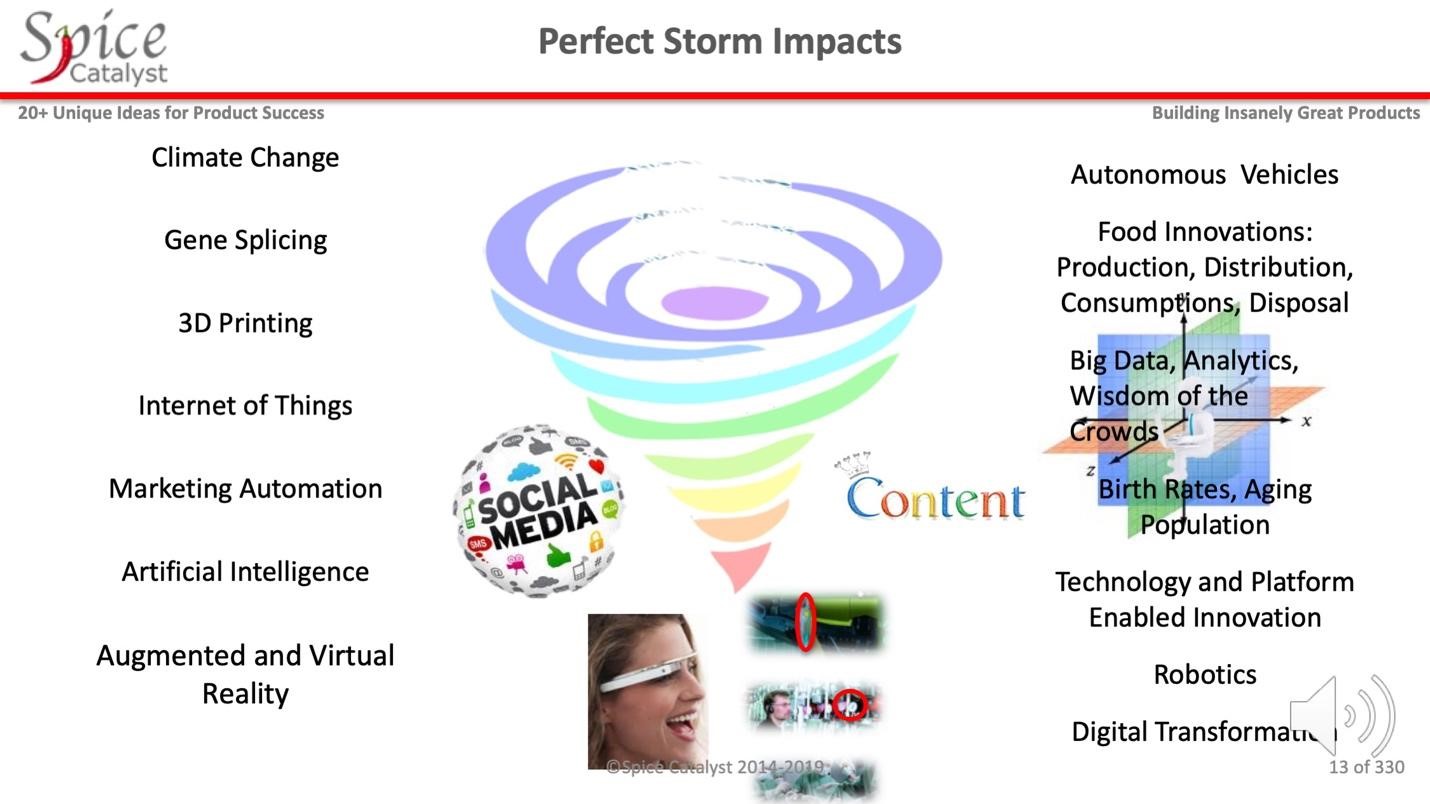Product Management

The Appleton Greene Corporate Training Program (CTP) for Product Management is provided by Mr. Fradin Certified Learning Provider (CLP). Program Specifications: Monthly cost USD$2,500.00; Monthly Workshops 6 hours; Monthly Support 4 hours; Program Duration 48 months; Program orders subject to ongoing availability.

Personal Profile
Professor Fradin has experience in building successful products and services since 1969, at organizations including Hewlett-Packard as well as Apple, where he was at the same management level as Steve Jobs.
Professor Fradin also heads a professional development company (Spice Catalyst, Inc) specializing in building insanely great products, product management, and product marketing and has trained thousands of managers throughout the world based on his experience at Hewlett-Packard, Apple, and across 75 products and services and eleven startups.
His clients have included Cisco, GameStop, Botswana Telecommunications Company, IDA Singapore, Pitney Bowes, Capital One Bank, Infosys, Cognizant, and many others.
To request further information about Mr. Fradin through Appleton Greene, please Click Here.
(CLP) Programs
Appleton Greene corporate training programs are all process-driven. They are used as vehicles to implement tangible business processes within clients’ organizations, together with training, support and facilitation during the use of these processes. Corporate training programs are therefore implemented over a sustainable period of time, that is to say, between 1 year (incorporating 12 monthly workshops), and 4 years (incorporating 48 monthly workshops). Your program information guide will specify how long each program takes to complete. Each monthly workshop takes 6 hours to implement and can be undertaken either on the client’s premises, an Appleton Greene serviced office, or online via the internet. This enables clients to implement each part of their business process, before moving onto the next stage of the program and enables employees to plan their study time around their current work commitments. The result is far greater program benefit, over a more sustainable period of time and a significantly improved return on investment.
Appleton Greene uses standard and bespoke corporate training programs as vessels to transfer business process improvement knowledge into the heart of our clients’ organizations. Each individual program focuses upon the implementation of a specific business process, which enables clients to easily quantify their return on investment. There are hundreds of established Appleton Greene corporate training products now available to clients within customer services, e-business, finance, globalization, human resources, information technology, legal, management, marketing and production. It does not matter whether a client’s employees are located within one office, or an unlimited number of international offices, we can still bring them together to learn and implement specific business processes collectively. Our approach to global localization enables us to provide clients with a truly international service with that all important personal touch. Appleton Greene corporate training programs can be provided virtually or locally and they are all unique in that they individually focus upon a specific business function. All (CLP) programs are implemented over a sustainable period of time, usually between 1-4 years, incorporating 12-48 monthly workshops and professional support is consistently provided during this time by qualified learning providers and where appropriate, by Accredited Consultants.
Executive summary
Product Management
This course is dedicated to one goal:
Help organizations reduce product and/or service failure and enhance the chances of product success. The course is for anyone who is responsible for success including new products or revisions. The result is an actionable plan.
Studies have found that 40 percent of products fail for a multitude of reasons. All too often, product failures lead to company failures also. In 2014 alone, over 600 billion ($0.6 trillion) dollars were wasted, and that number continues to grow each year.
Part of the reason for this failure rate is that within the organization they lack some of the 130 competencies required for product success. These workshops provide the training for those competencies.

The course starts with the keys to product/services success, then covers the product’s market strategy, and finishes with the fundamentals of marketing.
The first year covers the basics of the keys to product success, design thinking, innovation, history of product management, the product management lifecycle, product success competencies, being customer-centric, the company values and vision, customer journey, the changing business environment, tools, and careers.
The second and third year covers the product’s market strategy including understanding what the customer wants to do, how to do market research, innovation methodology, markets and sizing, value proposition, personas, adoption cycles, segmentation, total addressable market, competition, positioning, roadmaps, portfolios, channels, sales forecasting, budgeting, ROI, intellectual property, product descriptions, market penetration, analysis, and training.
The fourth year covers metrics and completing the product market plan and then moves on to marketing with understanding the differences between markets, marketing strategies, the eleven Ps of marketing, how to generate sales leads on the Internet, media, and mix, messaging and content, packaging, bundling, promotions, marketing communications, budgeting and scheduling, and finishing on metrics.
The principal author of the workshops has over fifty years of experience starting in 1969 and across a range of hardware and software products including at Hewlett-Packard and Apple. Each combines the best of lectures, student exercises, examples, discussions, and quizzes.
Thousands worldwide have taken these workshops since 2012.
Much of what is in these workshops is not taught in most MBA or business school programs. It is the “secret sauce” of product success. As a result, many in business repeat the same mistakes over and over again which just continues product failure because that is the way we did it before.
The workshops teach what needs to be done for product success and how to do it. It provides the basis for product ideas coming from inspiration, vision, technology, or ideas to be successful.
The workshop includes unique success ideas and insights the principal author has acquired through the years and experience. They include:
1. The Six Keys to Building Insanely Great Products. While most “experts” usually talk about the three keys to product success: Plan, Process, and Information, I’ve added People, Customers and Systems
2. How to do market research by observing “dos”, conducting interviews, surveys, and utilizing big data
3. The importance of customer loyalty and building insanely great customers
4. A new innovation methodology
5. Using personas for development, not just marketing
6. Identifying the value proposition before starting development
7. In addition to listing your product’s features, advantages, and benefits, including what task it is trying to accomplish, and the problem that each feature solves
8. An improved way to do feature prioritization for development
9. A novel way to estimate market sizes
10. The importance of correct market segmentation
11. Product positioning based on what is important to the customer, not some arbitrary criteria
12. Doing competitive research on products and on the competing companies plus updating a time of product release
13. Developing multiple product roadmaps for different uses and purposes
14. The importance of having the right information at the right time
15. Ensuring that you have the marketing and sales channel to cater to the geographical area where your customer lives
16. A new product lifecycle management framework
17. Taking the customer journey, the digital transformation, and the need to build insanely great customers into account while doing product planning.
18. Also, keeping in mind future considerations of how social, political, environmental, economic, technological, and governmental trends will impact building insanely great products
19. Considering employees as an asset and not a liability
20. Having the right computer systems and tools to get the job done and being trained on them
21. Understanding how to organize the function of product success managers and how to ask for the authority
This course teaches each of the topics depicted in the framework below to enhance the prospects of product and/or services success.

The course is based on over 50 years of experience managing products and services covering hardware, software, internet, video, computer-based training, mobile, advertising, manufacturing, and Software as a Service.
The course includes 48 workshops. In the future, more advanced workshops could be provided in each topic area.
Curriculum
Product Management – Part 1 – Year 1
- Part 1 Month 1 What Must Products Have to Succeed?
- Part 1 Month 2 Design Thinking
- Part 1 Month 3 Innovation
- Part 1 Month 4 History of the Successful Management of Products and What distinguishes Products and Services
- Part 1 Month 5 Business Model, Plan, and Canvas and Product Management Lifecycle and Framework
- Part 1 Month 6 Product Management Competencies
- Part 1 Month 7 What Makes a Customer-Centric Organization?
- Part 1 Month 8 Role of Values and Vision
- Part 1 Month 9 Understanding the Customer Journey
- Part 1 Month 10 The Changing Business Environment Creating Insanely Great Customers
- Part 1 Month 11 Systems and Tools for Product Management
- Part 1 Month 12 Careers in the Successful Management of Products
Product Management – Part 2 – Year 2
- Part 2 Month 1 Successful Management of Products in Startups
- Part 2 Month 2 Building a Product Market Strategy
- Part 2 Month 3 Understanding the Value of Do
- Part 2 Month 4 How to Define a Do
- Part 2 Month 5 Information Gathering: Market Research
- Part 2 Month 6 Going to Development: Innovation and Methodology
- Part 2 Month 7 Discovering New Markets and Market Sizing
- Part 2 Month 8 Defining Value Proposition
- Part 2 Month 9 Describing Personas
- Part 2 Month 10 Market Adoption Cycles
- Part 2 Month 11 Market Segmentation
- Part 2 Month 12 Total Available and Addressable Market
Product Management – Part 3 – Year 3
- Part 3 Month 1 Competitive Environment
- Part 3 Month 2 Product Positioning
- Part 3 Month 3 Product Roadmaps
- Part 3 Month 4 Product Portfolios
- Part 3 Month 5 Channels, Partners, and Affiliates
- Part 3 Month 6 Pricing Strategy
- Part 3 Month 7 Sales Forecasting
- Part 3 Month 8 Budgeting, ROI and Metrics
- Part 3 Month 9 Intellectual Property and Protection of Ideas
- Part 3 Month 10 Writing Product Descriptions
- Part 3 Month 11 Penetrating Existing and New Market
- Part 3 Month 12 Performing a SWOT Analysis
Product Management – Part 4 – Year 4
- Part 4 Month 1 Planning for Product Training
- Part 4 Month 2 Metrics, Analysis and Reporting
- Part 4 Month 3 Developing a Product Market Strategy Plan
- Part 4 Month 4 Marketing and Marketing Plan
- Part 4 Month 5 Understanding Marketing Differences
- Part 4 Month 6 Marketing Strategies and the 11Ps
- Part 4 Month 7 Generating Leads Online
- Part 4 Month 8 The Media Mix
- Part 4 Month 9 Messaging and Content
- Part 4 Month 10 Packaging, Bundling, and Promotions
- Part 4 Month 11 Marketing Communications
- Part 4 Month 12 Managing Budgets, Schedule, and Metrics
Program Objectives
The following list represents the Key Program Objectives (KPO) for the Appleton Greene Product Management corporate training program.
Product Management – Module 1
Organizations typically don’t have all the 130 skills and competencies to enable product success. As a result, billions are wasted on product failures that can be avoided if an organization can acquire the competencies for success.
The objective of this program is to teach the critical competencies for product success.
Topics covered in this module:
Year One
Workshop 1.1 What Must Products Have to Succeed?
Workshop 1.2 Design Thinking
Workshop 1.3 Innovation
Workshop 1.4 History of the Successful Management of Products and What distinguishes Products and Services
Workshop 1.5 Business Model, Plan, and Canvas and Product Management Lifecycle and Framework
Workshop 1.6 Product Management Competencies
Workshop 1.7 What Makes a Customer-Centric Organization?
Workshop 1.8 Role of Values and Vision
Workshop 1.9 Understanding the Customer Journey
Workshop 1.10 The Changing Business Environment Creating Insanely Great Customers
Workshop 1.11 Systems and Tools for Product Management
Workshop 1.12 Careers in the Successful Management of Products
Year Two
Workshop 2.1 Successful Management of Products in Startups
Module description
This foundational module gives you a birds-eye view of the entire Product Management lifecycle and the key elements that make a product successful.
The idea is to help you understand what makes products successful in today’s competitive business environment before you can delve deeper into the “how” of each aspect of the product lifecycle.
The module discusses how the concept of Product Management evolved from successful organizations such as HP and Apple, and how the role of Product Managers began to be defined. It explains how services and products differ, and what it takes for organizations to transition into a holistic product approach from a services approach to business. It introduces an overview of the various frameworks and approaches for the management of successful products, starting with the product market strategy and business canvas, to the various competencies, values, and visions organizations need to have for successful management of products, to the secret sauce for developing innovative and successful products—understanding what customers do as well as the complete customer journey.

Year 1
1.1 Workshop: What Must Products Have to Succeed?
This workshop explores the six keys to product success: Product Market Strategy, repeatable processes, having the information necessary to get the job done, understanding what your customers want to do, add ensuring your employees have the skills and competencies to get the job done.
At the end of this workshop, the student will be able to:
• Define product management
• Discuss six key steps to product success

1.2 Workshop: Design Thinking
This workshop will enable students to learn the concepts of design thinking and innovation and how to apply them to product development.
Design thinking is a systematic approach to product development starting with understanding clearly and deeply what the customer wants to do, translating that into unmet customer needs with a focus on desired customer outcomes. Design thinking encompasses creative approaches to the problem, rapid prototyping, and testing. Design thinking substantially enhances the success rate of innovation.
At the end of this workshop, the student will be able to:
• Understand the design thinking process
• Identify and evaluate opportunities from a customer focus
• Develop product specifications
• Engage creative thinking
• Rapid prototyping
• Design
• ROI

1.3 Workshop: Innovation
Innovation means a new or enhanced product that does things better, faster, with higher quality, or style. New technologies, processes, and markets can drive innovation.
At the end of this workshop, the student will be able to:
• Learn about innovation
• Types and examples
• Sources and factors
• Influencers
• Class Exercise: Apply design thinking and innovation to a problem

1.4 Workshop: History of the Successful Management of Products and What distinguishes Products and Services
Those who fail to know history are doomed to repeat it. This workshop discusses the origin of the management of products starting in 1932 and to the present time.
At the end of this workshop, the student will be able to:
• Discuss the various organizational strategies that have influenced the way organizations conduct business today
• Understand the role of Product Managers
This workshop discusses what is a product and what is a service. It will cover what aspects are similar and which are different.
At the end of this workshop, the student will be able to:
• Distinguish between products and services

1.5 Workshop: Business Model, Plan, and Canvas and Product Management Lifecycle and Framework
This workshop will discuss the various organizational strategies that have influenced the way organizations conduct business today and develop an understanding of the role of Product Managers.
At the end of this workshop, the student will be able to:
• Describe a business model
• Discuss a few popular types of business models
• Use tools such as BMC and PMSC to document a business model
This workshop presents the Spice Catalyst product management lifecycle and framework depicted here:

Each of the components of the framework is discussed in a brief overview and how they fit together, and which parts need to be done before others. Product success depends on this. Product and/or services failures are because all of the key components are not done or not done in order.
At the end of this workshop, the student will be able to:
• Identify the pre-requisites for building a product management framework
• Discuss the various aspects of an agile product management framework
• Discuss the various stages in a product management framework
• List the various requirements for creating insanely great customers

1.6 Workshop: Product Management Competencies
To have a successful product or service, an organization needs a basic, advanced, and professional level of competencies or skill sets. This workshop will cover each of those competencies.
At the end of this workshop, the student will be able to:
• Discuss key hard skills required for managing products successfully
• Identify the various competencies required for product market strategy
• Identify the competencies for product marketing
• Identify the competencies for product development, operations, and end-of-life
• Discuss the soft skills needed for product management
• Understand the role of a product manager

1.7 Workshop: What Makes a Customer-Centric Organizational Structure?
Customer-Centric means being focused like a laser on the needs of the customer. But all too often the organization is structured in order for it to be managed thus frequently requiring the customer to know how the organization is structured in order to get their needs fulfilled successfully. Companies like Apple and Amazon make customer satisfaction the top priority thus creating loyal and repeat customers.
At the end of this workshop, the student will be able to:
• Discuss various organizational structures
• Explains a Product Management Focused Organizational Structure
• Use a few tools to facilitate a customer-centric organizational structure

1.8 Workshop: The Role of Values and Vision
The values of an organization, if followed, are carried into every decision it makes about everything. As a result, those organizations that have and stick to their values are usually successful. Those that don’t typically fail. An organizational “vision” is their view of the overall goal, direction, “north star” they are trying to achieve. Organizations with a clear vision typically have products and/or services that succeed. Combining values and vision results in a Mission Statement.
At the end of this workshop, the student will be able to:
• Understand what values are and why they are important
• Understand what a product vision is
• Define a mission statement
• Discuss how values, vision, and mission create the organization’s culture

1.9 Workshop: Understanding the Customer Journey
The journey a customer takes from the point in which they understand they need to do something to buying it and using it has changed dramatically over the past 15 years greatly due to the internet and social media. This workshop will describe the new customer journey in detail and have the participants work out what that means for all aspects of their product or service.
At the end of this workshop, the student will be able to:
• Identify the various stages in a customer’s journey
• Explain the ‘always-on’ approach for innovation and creating great customers

1.10 Workshop: The Changing Business Environment Impacting Successful Product Management
Sometimes called the “Perfect Storm” nearly two dozen massive changes are occurring and that was before the Covid pandemic and the Russian-Ukrainian war. Understanding what they are and how to deal with them probably will have a significant impact on product/services success.

At the end of this workshop, the student will be able to:
• Discuss various factors which are changing the rules for product strategy and customer engagement
• Explain the effect of the digital revolution on product-market strategy
• Identify various technological changes that affect the management of products
• Discuss the effect of social media on the management of products
• Explain some of the economic, environmental, political, and education industry changes that will affect product management in future

1.11 Workshop: Systems and Tools for Product Management
In the same way carpenters, writers, artists need special tools for their craft, so does product success manager. But only recently some unique tools for things like idea generation, road mapping, team coordination, and status reporting have become available. This workshop will delve into that.
At the end of this workshop, the student will be able to:
• List some tools available to Product Managers
• Discuss some of the challenges of these tools
• Decide how to choose a tool

1.12 Workshop: Careers in the Successful Management of Products
Since the basis of product success management started at Procter and Gamble (P&G) in 1932 (as brand managers), every president of P&G since then has come out of brand management. Today many CEO and entrepreneurs have backgrounds and experience in product success management. This workshop will give participants an in-depth look into the role and potential.
At the end of this workshop, the student will be able to:
• Identify what to look for while job-hunting for product management roles
• List some career options and roles in the area of product management
• Identify some key factors such as the value of exploring, networking and compensation while looking for a product management role

Year 2
2.1 Workshop: Successful Management of Products in Startups
A startup is different from a larger, established organization. This workshop will delve into the differences and similarities. Usually, the startup founders perform the role of product success management and all other functions like accounting, human resources, facilities, marketing, sales, support, service, etc. But as the organization grows, they need to delegate the role of product success to experts in the field or they will find themselves overextended.
At the end of this workshop, the student will be able to:
• Understand the need for product management in startups
• Identify some key mistakes startups make, and ways to avoid these pitfalls
Product Management – Module 2
Module Two: Product Market Strategy and Product Planning
This Module covers in-depth all key aspects, tasks, and processes to develop a sound product-market strategy.
Product Market Strategy is one of the core pillars on which the success of a product depends. This module helps you understand hands-on how to focus on the user need by defining and prioritizing what a customer wants to do with personas, how to do market and competitive research, how to focus on innovation and methodology, how to identify target markets and sales forecast, create a compelling value proposition, product portfolio and roadmap, and finally the pricing, business model and product training strategy. This module is the necessary groundwork to be done as the first key step of product development and the successful management of a product or service. At the end of the module, you would have created your own product market strategy
Topics Covered in the Module
Year 2
Workshop 2.2 Building a Product Market Strategy
Workshop 2.3 Understanding the Value of Do
Workshop 2.4 How to Define a Do
Workshop 2.5 Information Gathering: Market Research
Workshop 2.6 Going to Development: Innovation and Methodology
Workshop 2.7 Discovering New Markets and Market Sizing
Workshop 2.8 Defining Value Proposition
Workshop 2.9 Describing Personas
Workshop 2.10 Market Adoption Cycles
Workshop 2.11 Market Segmentation
Workshop 2.12 Total Available and Addressable Market
Year Three
Workshop 3.1 Competitive Environment
Workshop 3.2 Product Positioning
Workshop 3.3 Product Roadmaps
Workshop 3.4 Product Portfolios
Workshop 3.5 Channels, Partners, and Affiliates
Workshop 3.6 Pricing Strategy
Workshop 3.7 Sales Forecasting
Workshop 3.8 Budgeting, ROI and Metrics
Workshop 3.9 Intellectual Property and Protection of Ideas
Workshop 3.10 Writing Product Descriptions
Workshop 3.11 Penetrating Existing and New Market
Workshop 3.12 Performing a SWOT Analysis
Workshop 4.1 Planning for Product Training
Year Four
Workshop 4.2 Metrics, Analysis and Reporting
Workshop 4.3 Developing a Product Market Strategy Plan

2.2 Workshop: Building a Product Market Strategy
A successful product must have a strategy or plan for a particular market or market. Often confused with marketing, a market is a place one goes to buy something like a grocery store. Marketing is the effort to persuade prospective customers to go to the store or market. An effective and successful product market strategy consists of up to thirty-two parts or topics. This workshop provides an overview of those market strategy components and sets the stage for the remaining workshops of the module delving deeply into each component.
At the end of this workshop, the student will be able to:
• Define a product market strategy
• Identify the steps to build a product market strategy
• Describe the process for building a product market strategy

2.3 Workshop: Understanding the Value of Do
Some call it “Outcome-Based Innovation”, others “Jobs to be Done”. But understanding the customer at such a grandiose scale is often not granular enough to be able to define exactly what the product or service must do for the customer.
For example, suppose the outcome or job to be done is to go downtown and have lunch. Such a level ignores such things as where to have lunch, what time, when to leave, how to get there, where to park, and so forth. We call those things “do” which is what must be done.
At the end of this workshop, the student will be able to:
• Define a “do” that is what is it that people and organizations do to get their jobs and outcomes done.
• Explain the value of do
• Explain how do defines the market for a product

2.4 Workshop: How to Define a Do
This workshop delves into the who, what, when, why, where, and how things need to get done. In addition to the importance of getting that thing(s) done and the satisfaction with the current way of getting it done. Then with factoring in importance and satisfaction, this workshop presents a better way of prioritizing product/service features.
At the end of this workshop, the student will be able to:
• Understand what an outcome and a do is
• Gather information to define the outcomes and the dos
• Prioritize do’s
• Use dos for development

2.5 Workshop: Information Gathering: Market Research
This workshop teaches the basics of market research. It starts with learning how to observe your potential customers gain insight into what they are doing. Then the drafting of the initial interview questions is followed by converting what is learned in those questions into a survey form. Instructions on how to perform an unbiased survey with a sample size sufficient to be used to forecast the size of the market are covered next. Typical market research techniques and mistakes are covered in depth. How to use keyword searches by the target customers is also covered and then using the learnings from market research to help prioritize the features of the product or service to help the customer get done what they want to get done.
At the end of this workshop, the student will be able to:
• Use observation as a primary research tool
• Perform interviews for primary research
• Conduct surveys
• Understand some typical research mistakes
• Perform analytics using keywords
• Use the research results to prioritize Do’s

2.6 Workshop: Going to Development: Innovation and Methodology
This workshop covers the steps of the agile development process from the product manager’s point of view. As opposed to the development team’s point of view. It also discusses the nature and features of the waterfall development process and combinations of waterfall and agile. The workshop ends with identifying some key methodologies for innovation.
At the end of this workshop, the student will be able to:
• Discuss the features and key steps of the agile process
• Discuss the features of the waterfall process
• Discuss the importance of innovation in product development
• Identify some key methodologies for innovation

2.7 Workshop: Discovering New Markets and Market Sizing
This workshop will help the student understand what factors are important in helping find and discover new markets and adjacent markets. Using survey data from workshop 2.5, this workshop enables the student to size the markets. A key factor in sales and market growth is the S curve. It is explained in detail as a caution against being overly zealous about product sales growth or market growth. The workshop ends with a discussion of the importance of customer loyalty in fostering additional product sales growth and market growth.
At the end of this workshop, the student will be able to:
• Understand some factors which help discover markets
• Understand how to size the market
• Explain market growth with S-curve
• Discuss the value of customer and brand loyalty to help market growth

2.8 Workshop: Defining Value Proposition
The product or services value proposition is one of the most important things, that the product success manager must articulate. This workshop will help the student understand the value proposition’s importance and the basis upon which it is generated. The workshop will include creating a value proposition for a business-to-business and for a business-to-consumer product or service. Lastly the workshop will enable and teach the student how to write features, advantages, and benefits chart which also includes the problem solved and the things that people do that each feature addresses.
At the end of this workshop, the student will be able to:
• Understand the importance of value proposition
• Discuss the basis of a value proposition
• Identify the sources of the value proposition
• Create a value proposition and measure gain: pain ration
• Use a Feature/Advantage/Benefits (FAB) Chart

2.9 Workshop: Describing Personas
The customer persona brings the target customer to life. It helps understand completely the prospective customer. Additionally, it helps focus the entire organization on the same customer or customers. This workshop will enable the student to define different personas for both business-to-business and business-to-consumer. It includes the research of and writing of the personas.
At the end of this workshop, the student will be able to:
• Define personas
• Identify and write personas for various types of requirements and businesses

2.10 Workshop: Market Adoption Cycles
In the early 1990s, Geoffrey Moore wrote the book “Crossing the Chasm”, which has been followed by companies in the Silicon Valley area and others around the world ever since. This workshop helps students understand the adoption cycle, how to crossover the chasm, the diffusion of innovation and understanding customer behavior using the VALS system. The student will also explore their products or services in terms of their stage of market adoption.
At the end of this workshop, the student will be able to:
• Understand the adoption cycle
• Understand how to cross the chasm
• Understand diffusion of innovation
• Identify consumer behavior using VALS
• Describe customer stages as per product markets

2.11 Workshop: Market Segmentation
In this workshop, the student will learn about the concept of segmenting a market including how to identify which of those market segments should be a target, and how to define those market segments. Additionally, the student will learn how to draw up a market segment plan and understand how outcome based segmentation can be accomplished.
At the end of this workshop, the student will be able to:
• Explain the concept of market segments
• Identify your customer segments
• Define your market segments
• Draw a market segment plan
• List the steps to outcome-based segmentation

2.12 Workshop: Total Available and Addressable Market
Not all available markets can be marketed to, sold to, or distributed to. Hence the student will learn in this workshop how to calculate what the available market might be and how it can be addressed.
At the end of this workshop, the student will be able to:
• Understand what a total available market (TAM) is
• Identify questions to ask to define total addressable market
• Identify your target market

3.1 Workshop: Competitive Environment
This workshop deals with the competitive environment for the product and the company. The student will learn what needs to be done to perform an adequate product versus product and company versus company competitive analysis.
At the end of this workshop, the student will be able to:
• Explain aspects to be kept in mind when doing competitive research
• Perform a product versus product competitive analysis
• Perform a company versus company competitive analysis

3.2 Workshop: Product Positioning
One of the most important things that a product success manager must be able to do is to position the product in the market. Product positioning is the state of mind. A stake in the ground.
Using a radar chart, the student will learn to identify the key points of the product positioning statement at how to write that statement. Plus, the student will learn the characteristics of a good one and a bad one.
At the end of this workshop, the student will be able to:
• Explain the importance of product positioning
• Understand and develop a product positioning radar chart
• Develop product positioning statement using the positioning statement template
• Distinguish between a good and not so good positioning statement

3.3 Workshop: Product Roadmaps
A product road map describes for the internal organization where the product is at and where it is going. The road map can also be used by the sales force to give comfort to selected customers a larger understanding of the direction the product will be taking. The student in this workshop will learn about these things and how to identify those elements that should be on the different kinds of road maps for different audiences.
At the end of this workshop, the student will be able to:
• Understand the purpose of a roadmap
• Identify the various types and categories of a roadmap
• Identify elements to be added to your roadmaps

3.4 Workshop: Product Portfolios
A product portfolio is a series of products that are related to one another. There could be a product and then a more senior product, say called. Pro.” In this workshop. The student will learn. About the need for a. Product portfolio for the product spective. Prospective. Customer. End. For the company. The student will also learn about the different. Portfolio management phases. At how the Boston Consulting group’s advantage matrix can be used to develop a balanced portfolio. Additionally, the student will learn about the common mistakes. And the key aspects of portfolio management.
At the end of this workshop, the student will be able to:
• Understand the need for a product portfolio
• Explain phases for portfolio management
• Identify how the BCG Advantage matrix can be used to maintain a balanced portfolio
• Discuss common mistakes of a product portfolio
• Explain key aspects of portfolio management

3.5 Workshop: Channels, Partners, Affiliates, and Product Training
It is not enough to just develop a product that does what the customer wants it to do. To be successful. The student have to have a way of distributing the product through appropriate channels and use partners and affiliates to reach markets the student normally would not be able to reach.
At the end of this workshop, the student will be able to:
• Identify the role and importance of channel partners
• List various types of channel alliances
• Explain the concept of Integrated Distribution Channels, and discuss how to select channels and avoid channel conflict
• Explain various considerations for establishing channel partnership

3.6 Workshop: Pricing Strategy
Your pricing strategy decides what to strive for: unit market share, or maximize profit, or cash cow or premium pricing. In this workshop the student will learn about the different pricing strategies and how to apply them. The students will also learn how to set their pricing goals add keep it consistent with the prices offered in the channel thus avoiding channel conflict.
At the end of this workshop, the student will be able to:
• Discuss the history of pricing strategies
• Explain various pricing strategies and their applications in various scenarios
• Determine your pricing goals
• Identify various aspects of channel price management
• Understand the concepts of the total cost of product ownership from the customer perspective

3.7 Workshop: Sales Forecasting
Product success managers are frequently called upon to forecast what the sales might be in the future to enable manufacturing to decide how much of the product to build. This workshop will teach the student the factors to use for the sales forecast and the steps to make the forecast including which data should be gathered.
At the end of this workshop, the student will be able to:
• Understand the factors you can base your sales forecast on
• List the steps to make a sales forecast
• Explain some methodologies for determining a sales forecast

3.8 Workshop: Budgeting, ROI and Metrics
A successful product is a product that returns a good return on investment. This workshop will cover the basics of setting a budget for the product and which best metrics to pick to follow the product’s success thus enabling the product manager to make corrections to improve success.
At the end of this workshop, the student will be able to:
• Understand the need for the discipline of product financial budgeting
• Understand some of the key budgeting types
• Define some of the approaches to track product company expenses
• Understand the financial viability of the product development and go-to-market

3.9 Workshop: Intellectual Property and Protection of Ideas
For a company to protect its intellectual property it has a choice from using such things as copyright, trademark, service mark, and patents. This workshop teaches the student about those things in terms of what they accomplish and how they are different. In addition, it discusses how to search for existing patents and apply for a new patent. Plus, the concept of a license agreement, an open-source license, and other means of protecting R&D innovations. Lastly, the importance of intellectual property at its impact on the brand of the product is explored.
At the end of this workshop, the student will be able to:
• Understand the concepts associated with copyright, Intellectual Property, Trademark, Service Mark and so forth
• Discuss patent and typical business benefits
• Identify how to search for and apply for a patent
• Understand the contents of the product license agreement
• Understand open-source license
• Discuss the need for protecting own R&D innovations
• Plan to enhance the brand image with IP

3.10 Workshop: Writing Product Descriptions
A clear and persuasive product description is not easy to write but it’s critical for product success. This workshop will help the student understand the market opportunity for their product or their service and how to write an effective product description.
At the end of this workshop, the student will be able to:
• Define product market opportunity by asking the right questions
• Write an effective product description

3.11 Workshop: Penetrating Existing and New Market
In this workshop, the student will learn about the definition of penetrating a market and how to use the concept of the growth matrix in order to prepare their penetration strategy.
At the end of this workshop, the student will be able to:
• Define market penetration
• Explain the product growth matrix for market penetration

3.12 Workshop: Performing a SWOT Analysis
A Strength, Weaknesses, Opportunities, and Threats or SWOT analysis is useful in order to figure out how to market a product or service and where to focus resources. In this workshop, the student will learn how to write a SWOT analysis.
At the end of this workshop, the student will be able to:
• Perform a SWOT analysis

4.1 Workshop: Planning for Product Training
The student in this workshop will learn about the different kinds of training needed for sales, and for support in addition to the channel training.
At the end of this workshop, the student will be able to:
• Understand the needs for product training
• Identify and detail the training needed for sales and support
• Develop a sample training plan

4.2 Workshop: Metrics, Analysis, and Reporting
In order to have a successful product, one must understand what metrics to follow in order to monitor success, how to analyze those metrics and report them to the key decision makers in the organization. This workshop will enable the students to accomplish these things.
At the end of this workshop, the student will be able to:
• Discuss the importance of metrics
• Share a few examples of metrics for measuring various product management activities

4.3 Workshop: Developing a Product Market Strategy Plan
Now that the student has learned what are the key elements of a product market strategy, this workshop enables them to pull it all together in a product market strategy plan. The student can incorporate key elements from that plat in a product market strategy business canvas.
At the end of this workshop, the student will be able to:
• Develop a product market strategy plan
• Develop a product market strategy canvas
Product Management – Module 3
Module Three: Product Marketing
This Module focuses on taking you through all the steps of developing a solid marketing plan.
It discusses the 11 Ps of marketing and various aspects related to marketing mix, messaging, content, social media marketing, packaging, bundling, promotion focused at product launch and follow-up, and finally talks about developing a winning marketing communications and analyzing key metrics. At the end of the module, you should be thoroughly familiar with how to develop a comprehensive marketing plan.
Year 4
4.4 Workshop Marketing and Marketing Plan
4.5 Workshop Understanding Marketing Differences
4.6 Workshop Marketing Strategies and the 11Ps
4.7 Workshop Generating Leads Online
4.8 Workshop The Media Mix
4.9 Workshop Messaging and Content
4.10 Workshop Packaging, Bundling, and Promotions
4.11 Workshop Marketing Communications
4.12 Workshop Managing Budgets, Schedule, and Metrics

4.4 Workshop: Marketing and Marketing Plan
Marketing is the pulling effort to get the prospective customer to buy your product or service. In this workshop, the student will learn how to define a marketing plan, what are the marketing plan’s key aspects and incorporate social media marketing.
At the end of this workshop, the student will be able to:
• Define a marketing plan
• Identify the key aspects of marketing today
• Identify aspects of social media marketing

4.5 Workshop: Understanding Marketing Differences
How marketing is done is different based upon the geographical location. the target demographics, the bias of the particular market and other criteria. In this workshop, the student will learn about these differences and how to compensate and adjust.
At the end of this workshop, the student will be able to:
• Identify the differences in markets based on geographies, demographics, bias and other criteria

4.6 Workshop: Marketing Strategies and the 11Ps
Over the years, the number of Ps (Like Price, Positioning, Place, Promotion, etc.) in marketing have increased considerably. Especially in the advent of social media. This workshop will teach the student about the 11 PS of marketing and how to pick a suitable mix for their particular product or service. It then delves into implement the marketing techniques required for success.
At the end of this workshop, the student will be able to:
• Identify the 11 Ps of marketing
• Select a suitable mix of marketing strategies
• Identify some marketing techniques required

4.7 Workshop: Generating Leads Online
As the influence of on-line marketing increases along with its impact on sales it’s important that the student understand the basics of search engine optimization and lead generation. In this workshop the student will learn how to calculate investment return for their social media marketing and how to build reach generate leads and create content.
At the end of this workshop, the student will be able to:
• Understand the basics of SEO for marketing and lead generation
• Calculate return on investment for online marketing
• Build reach online
• Generate leads online
• Create content for online marketing

4.8 Workshop: The Media Mix
The marketing plan will call out the media mix between such media as TV, Radio, Print, Magazines, newsletters and social media. The student in this workshop will learn about the alternative medias, how to use them and put together an appropriate mix for their product’s success.
At the end of this workshop, the student will be able to:
• Discuss various options for your media mix
• Discuss the use of advertising
• Discuss the use of social media
• Put together a media mix strategy and plan

4.9 Workshop: Messaging and Content
Based upon the value proposition and the product positioning developed for the product market strategy this workshop will cover how to put that together into a marketing message framework targeted at the target personas. It will also discuss how to create messages for customers across their customer journey Plus ensure the discovery of social media content that supports the messaging.
• Develop the marketing message framework
• Create messages for various personas
• Create messages for customers across the customer journey
• Ensure discovery of content that supports messaging

4.10 Workshop: Packaging, Bundling, and Promotions
Marketing goes beyond just messaging and the media mix. It also includes packaging, bundling and promotions. In this workshop, the student will learn more about the importance of packaging and how bundling of different products can create a sense of increased value for the customer. Packaging and bundling will drive sales. Lastly this workshop, will delve into how promotions can help drive the sale of the product or service.
At the end of this workshop, the student will be able to:
• Discuss the importance of packaging
• Explain how bundling can be used for marketing
• Explain promotions for marketing

4.11 Workshop: Marketing Communications
Most large organizations have a marketing communications department responsible for the communications with such groups as customers, distribution channels, salespeople, media analysts and others. Each target customer, along with their specialized customer journey will require different marketing communications. An overlay to all of this is a public relations strategy which may be in the same marketing communications department or maybe separate at the corporate level. Which in turn might include product PR. This workshop will cover all of this.
At the end of this workshop, the student will be able to:
• Explain various types of marketing communication
• Develop marketing communication for various groups such as customers, distribution channels, salespeople, media, and analysts
• Develop marketing communication as per the customer’s journey
• Develop a PR strategy

4.12 Workshop: Managing Budgets, Schedule, and Metrics
A key to effectively managing a product is managing the budget for marketing and scheduling the events along with following the metrics for success. The student will learn about these things in this workshop.
At the end of this workshop, the student will be able to:
• Plan the tasks, responsibilities, and schedules of various members of the marketing team
• Plan the budget for marketing
• Calculate return on investment
• Decide on metrics for analysis of marketing efforts
Methodology
Product Management
Even though the profession of product manager and product marketing manager has been around since 1938, much of what they do to ensure product success is not taught in schools beyond general marketing and management. Starting in the late 1990s the profession started to be taught by private companies and a few Universities. In the 2010s a few additional companies started teaching, more conferences have been helped and a few more Universities started teaching months-long executive classes. Even with that, there exist less than a dozen books on the topic including three from the authors of this workshop.
To date, thousands of product managers and product marketing managers have been trained with the content of these workshops including such companies as Cisco, Capital One Bank, Botswana Telecommunications Company, WebEx, and many others.
Each of the 48-course workshops has this structure:
• Pre-lesson quiz to focus the student on the lessons to be learned
• Examples and stories to help remember key points
• Lecture supported by key bullet points
• Exercises from Course Workbook
• Group discussion of exercises
• Post lesson quizzes to measure improvements
in competencies as a result of the lessons, lectures, examples, and exercises
• Optional post-course mentoring
This structure is to maximize learning and provide the knowledge each student needs to gain the necessary competencies for product success.

The Process
As each of the workshops are completed the students will have used a template and understood how it works. Based on the learnings from the workbook template exercises, the student will be able to apply their learnings to products and services at their company or organization. For example, they will be able to:
• Assess if all of the key components of product success are present
• Research and write a comprehensive product market strategy
• Write a comprehensive marketing plan
Industries
This service is primarily available to the following industry sectors:
Technology
The technology business worldwide has undergone increasingly more rapid changes as time moves on and we move from an agriculture society to industrialization to consumer focus.
Things like geopolitical conflicts, pandemics, energy, electrification, content marketing, global warming, marketing automation, social media, big data analytics and artificial intelligence, agile design development, consumerization, mobilization of enterprise solutions, platforms such as cloud computing, and a host of APIs and services that are all making their contribution to the perfect storm of rapid change.
Computing began in the 1950 and ‘60s with mainframe computers that would fill an entire room. The 1970s brought mini-computers at about one-quarter the size. The ‘80s brought the desktop personal computer and by the ’90 they were in the driver’s seat of increased productivity worldwide. Today one can program a computer without knowing a programing language. Increasingly more rapid changes will continue to change the technology industry exponentially over time.
Technology, the organization of knowledge for practical purposes, will continue to enable innovation of doing things faster, better, with higher quality, and with style for all of the future. Except the rate of technological change will just be faster and faster and faster. It took over 50 years to go from the first air flight to jet engines. Today 20-year-olds don’t know what a check is, a phone booth, or a landline. That is in just 20 years.
Banking & Financial Services
Banking and Financial Services over the past recent years have been able to move their services from bricks and mortar offices on every street corner to increasingly digital. But in the digital transformation, it is essential the service does exactly, easily, and quickly what the customer wants to do when they want to do it.
For example, before depositing a check one had to go to the branch office. During the Afghanistan war, soldiers were issued checks in Afghanistan, and they had no way to get the money in their bank accounts for their families. Then AFFCU the Armed Forces Credit Union, which I helped train in product management, figured out a way for their members to take a picture of the check and then deposit it directly…all the way from Afghanistan! Later, other banks followed suit including Capital One Bank which I also trained.
Digital transformation services have a large component of user interfaces (UI) and the resulting user experience (UX). Frequently, however, the UI and UX are left to the computer programmers who are generally not trained for such thus resulting in a service that only they can figure out how to use.
The digital transformation for banking and financial services is only about two-thirds complete and organizations that offer more and better services will enjoy greater success over their competitors. In the same way, that Amazon’s digital transformation of bricks and mortar retail stores has revolutionized retail, the same is and will occur in banking and financial services.
More and more financial services will become digital, faster, and easier to do. Credit scores will be more and more reflective of the borrower’s ability to repay. Transferring money from country to country will become easier and less expensive. Real estate loans at affordable rates will become available digitally in developing countries thus offering decent housing for more and more people.
Consumer Goods
Massive changes in consumer goods creation, distribution, and sales are occurring.
In the creation of new consumer products and services new funding techniques like go fund me and others enable people and organizations without capital to raise the capital they need for product development and manufacturing. Overseas contract manufacturing reduces the capital cost considerably. 3D printing and “digital twins” enable prototyping at a fraction of the cost and time. These are just a few of the recent changes.
Before distribution required a distributor and then a retailer to get to the customer. Today, with digital technologies, direct to consumer is possible bypassing the distributor and the bricks and mortar retailer.
The customer journey from the trigger point, researching the problem, to identifying the alternatives, to selecting the solution, to buying the solution, to installing, to support and service, and lastly getting a return on investment has drastically shifted from salespeople being heavily involved in the qualifying and beginning parts of the journey to being involved primarily at the tail end of the journey.
Changes in what information needs to be provided throughout the customer journey will continue and will accelerate. Successful companies will be the ones that adjust the fastest and the best.
As the world’s economy continues to evolve including more nimble supply chains it will require more tools and techniques to be successful.
Prior to the 1950s companies had on hand several months of inventory so production can continue without interruption. But with the advent of highways, trucks, and air cargo, Hewlett-Packard helped teach Toyota just in time manufacturing which spread in the 1960s and later to many others. When supply chains were interrupted by Covid in 2020, manufacturing and distribution were in many cases brought to the breaking point. The Ukrainian war spread the disruption into the areas where Ukraine and Russia are major suppliers of oil, gas, titanium, aluminum, steel, nickel, corn, and wheat some of which are the building blocks of consumer products.
Organizations that understand these changes and can predict their impact and future changes will be the ones that thrive and succeed. Those that don’t, will not.
More and more consumer goods will be developed and marketed worldwide. Replicates of physical products will occur for more and more products. Known as a “digital twin” General Electric has developed a digital twin of its jet engine replicating in data the operation of the engine. With this information, GE can predict failure points and recommended maintenance. We can expect digital twins to be developed for many, many more products and services in the future.
Digital
Moving electrons around have always been the way things get done more productively. The industrial revolution started things off with the cotton gin, steamships, railroads, trucks and cars, airplanes, and so forth. This way of moving electrons was physical.
The chemical revolution was next with such products as rubber, fertilizers, and plastics.
Today we have the information or digital revolution. Instead of transporting oneself to some other place we teleport with video conferencing. Instead of going to the store by car to get a product, we research and order the product over the digital internet pretty much from anywhere.
Instead of robbing a bank for gains, one conducts cyber theft. The examples go on and on.
More and more parts of human activity will become more and more digital because digital innovation enables things to get done better, faster, and at better quality. Those that don’t digitalize their business face failure.
For example, one company I consulted with and trained in digital transformation is Saudi Aramco’s plastic company Sabic (including formerly GE Innovation plastics). In the past, plastic or material engineers would figure out the characteristics of the material they needed for their product and then consult the Databook about them from the plastic companies.
However, in recent years, the digital tools like AutoCAD’s that these engineers used would offer a digital version of the Databook right there in the design tool from which to select and possibly order samples and production quantities with the approval and buy-in from purchasing. If Sabic was not represented in the Databook, their sales would gradually go away.
In the future, more and more products and services will be delivered digitally. Developing nations have digital transformation plans in the works. Competency in understanding what people and organizations want to do and transferring that to a digital implementation will become ore and more important in the future.
Electronics
Electronics is like consumer goods but also include business-to-business (BtoB) organizations like Cisco, Oracle, Hewlett-Packard, and others. Newer products that offer alternative energy sources like solar panels, converters, micro-grids, windmills, and batteries have the same characteristics.
For an organization selling to an organization that in turn sells to a consumer, it is essential that BtoB understand both what the organization they are selling to does and what their customer does better than their customer understands. For example, I teach and have taught since 2009 Cisco worldwide on innovation, design thinking, product management, and product marketing management these concepts. I teach them to go out and understand the needs of the customers of internet service providers one of their target market segments.
Major new product areas and new markets are going to develop rapidly. Like in the areas of alternative energy production, distribution and consumption, electrification of residences and businesses, telecommunications or Internet, transportation (autonomous vehicles), climate change, and others.
The march from doing things mechanically or chemically to using electrons will continue and will accelerate in the future. For example, an internal combustion auto has thousands of moving parts. A Tesla electric car, on the other hand, has just 17 drastically changing the cost and location of service and maintenance. Gas stations as we know them will disappear. More people and industries will produce their own power. Travel for business will go down. People will buy cars and let them run around transporting people and making money for them when they are not using them.

Internet
The internet was invented in 1983 at the US Department of Defense’s ARPANET or Advanced Research Projects Agency Network. By the 1990s it started replacing the time-sharing networks and established a client-server configuration. Netscape invented the graphical browser and email became mainstream. By the late 2000s social media, and later streaming video became mainstream. This followed the ability to edit first audio and then video on a computer.
The internet is rapidly moving into Internet 3.0 with distributed databases (blockchain) and improved security as it still flounders in containing fake information.
For society to survive, it is essential that the internet control human’s worst instincts and enhance its power for good.
For example, a false negative internet post whether it’s on Facebook, Twitter, or elsewhere tends to get ten times the click thru as a true post. Using the notion of “wisdom of the crowds” Google’s algorithms that the false post is more relevant that the true post and move that false one up on the search page.
It appears that how the Internet industry as a whole deals with these issues can very well determine the quality of life for the whole planet’s future.
The internet will get faster and faster to use. Cost less and will be available to more and more people worldwide. Things that are currently dumb will get smarter and smarter making our lives easier and more complex at the same time. In order for democracy and hence society to survive, the internet will maybe tackle the spread of false information and support people with the truth.
Locations
This service is primarily available within the following locations:

California: Silicon Valley
Starting in 1938 at the encouragement of Stanford Professor Fred Tierman, six students founded what later became Hewlett-Packard or HP. HP adopted a set of values known as the HP Way and a vision for the business that provided a foundation for the company to grow 20% per year for the next 50 years. By the time the area south of San Francisco was named “Silicon Valley” after Fairchild Semiconductor and Intel were formed the notion that startups can prosper with venture capital and ease of networking with no fear of failure the economic engine of California was started. It has since spread to its Capital Sacramento, and south to Santa Barbara, Los Angeles, Orange County, and San Diego.
Starting in the late 1980s and accelerating in the 1990s, high-tech companies started spreading out from the Palo Alto-San Jose axis up the peninsula to San Mateo and San Francisco. In the 2000s it spread north of San Jose to Fremont and on to Oakland. Then in the 2010s out into the valley cities of Pleasanton and Livermore.
Venture capital (VC) investments in Silicon Valley California represents about half of all US VC investments. But the cost of housing and office space and other costs of living in the Golden State has caused the cost of startups to be more expensive than in other areas of the world. But the ease of networking and venture capital has kept Silicon Valley on the forefront of innovation and invention.
California’s venture capital investments will probably continue into the future making it the continuing king of high-tech and the envy of the world.
Unfortunately, the negative impacts of Facebook, Google’s YouTube and Twitter’s ability to manipulate user data to spread false information rapidly and widely has tainted the entire “high-tech” industry even though high-tech includes such products and services as automobiles, batteries, lightbulbs, smartphones, computers, smart homes, smart grids, instrumentation, advanced agriculture, robotics, cloud and edge computing, data storage, artificial intelligence and more. Overcoming this tendency to paint all high-tech as evil will be a major challenge for the industry and its products and services successes.

Northeast United States: New York
Starting in the 1990s, and before in the 1970s in Boston, high-tech companies and startups started in New York City, upstate, and in the Washington, DC area. They borrowed the Silicon Valley model and developed their own ecosystem of entrepreneurs and investors. Today NYC represents one of the largest collections of high-tech startups and digital, internet and of course banking and finance in the world.
High tech continues to thrive and grow in NYC and throughout the Northeast. Many of the world’s largest companies are headquartered in NYC with telecommunications HQs nearby plus a lot of foreign companies. In addition to retailing, NYC has considerable world trade, transportation, and media including new social media, legal services, advertising, insurance and high-tech not to mention tourism.
Areas in the Northeast that have access to talent, infrastructure, and lower cost of housing will enable high-tech to continue to spread. Because NYC is the headquarters for Wall Street, much of the US financial industry, including debt capital, public equity, hedge fund management, private equity and mergers and acquisition the digitization of its businesses will continue to grow to provide lower cost of services, larger services areas and new products and services.

Europe: London
London in addition to being a financial capital it started seeing the growth of High-Tech businesses and independent entrepreneurs in the 2000s. Digital, internet, and technology are growing rapidly. London drained brains from the rest of the UK in search of greater opportunities. Good access by sea and the Channel Tunnel in 1994 connected the UK to the European continent.
In recent years several product management conferences and meetup groups have formed in London and participation has increased showing the importance about learning the key elements of product success. This is as a result of folks leaving existing high-tech companies like IBM and following an entrepreneur startup fashion.
This builds on London’s creative capital of innovative marketing, advertising, PR, and events management. Major financial companies are headquartered in London plus aerospace, defense, pharma biopharma, and now Fintech. London is now ranked third in the world as a tech hub behind Silicon Valley and Singapore. Its high-tech industry is growing six times faster than any other UK industry. It has a great talent pool, networking opportunities, and access to venture capital, incubators, universities and transportation.
With the increased demand, housing costs have gone up.
However, the recent Brexit has thrown a monkey wrench into its business and is still being worked out.
As a result of Covid, some startups are moving out of London now but to counter that, the Tech Nation Visa will let skilled EU citizens to work in the UK for up to five years. London’s established ecosystem for startups will continue to help provide its momentum. Biotech and chipmakers lead the way.
Many companies and entrepreneurs have left eastern Europe and Russia, have settled in London, and will try to develop and sell high-tech products and services, digital, financial, banking and internet. They too will need to learn what it takes to be successful.

India: Bangalore
Up until about 2010, India was mostly interested in cheap. That is the cheapest product or services they could find is what they bought. Separately about 2015 considerable interest developed in supporting startup companies. About 7000 new businesses were funded by a growing but inexperienced venture and angel investment community. All most all of them failed because they didn’t bother to learn and implement the keys to product success trained in these workshops.
The metropolitan area has a population of about 11 million.
Starting in the 2000s, Bangalore in the south-central part of India at a higher thus cooler elevation became home for many technology outsourcing companies like Infosys, Cognizant and Tata Consulting service. Driven initially by the K2 changes, they started to build on their services expertise to develop and market products.
It is widely considered the Silicon Valley of India.
Bangalore is the second-fastest-growing city in India and is ranked as the most livable city with a population of more than one million. In addition to its IT businesses, it is also home to many aerospace and defense organizations in addition to education and research institutions. Film production is also located in Bangalore.
Only until about 2019 interest grew to learn about product success. IIML the prestigious India Institute of Management at Lucknow in collaboration with Wiley started a post-graduate executive program in product management with hundreds graduating each year.
Other companies like Cisco, Dell, Phillips, Samsung, IBM, Apple, and others have opened campuses in the Silicon Valley of India. They have focused on technology, digital, electronics, and internet.
As more and more companies, startups, entrepreneurs, and investors recognize the need for trained product success managers, more in India will seek out that training.
Established companies that have opened development facilities in Bangalore, will over time, also want a product management function there next to their research and development people.
Cisco, for example, has a major research and development facility in Bangalore and started employing and training product managers in 2011. By 2018 pricing decisions that use to be made in Cisco’s San Jose headquarters were transferred to Bangalore despite the significant cultural differences between India and Cisco’s other major markets in North America and in Europe, the Middle East, and Africa.
A major new focus for product success will be consumer products, especially for the huge and growing India market whose culture is different and will require different products that the rest of the world.

Vietnam: Hanoi
After fighting for its independence for decades first from the French and later from the United States, Vietnam’s economy is being forecasted to grow the fastest in Southeast Asia for the foreseeable future.
In 1986 the country-approved economic policies set the stage for rapid urban development and economic growth.
Today the population of the Hanoi area is over eight million people with another 12 million in the metropolitan area. Saigon or Ho Chi Minh City is slightly larger.
Hundreds of startups have been formed and incubation centers backed by prospective investors have opened in HCM and Hanoi.
Three-quarters of the jobs in Hanoi are state-owned. But state-owned institutions are downsizing, and private enterprises are growing hence the need for product success training. The abundant and mostly female street vendors are microbusinesses that thrive under the capitalist framework of Hanoi today. They too will need to learn the keys to product and service success.
Hanoi is part of the Chinese Maritime Silk Road leading to India, the Mediterranean to Italy and Central Europe and the North Sea. Economic reforms of the 1980s started to decentralize governance and enable economic improvement. Over 60% of Vietnam’s scientists live in or near Hanoi. Many of Vietnam’s major universities are located in Hanoi.
In addition to existing industrial parks, a number of large and small to medium industrial clusters are being built. Many US, Japanese, Korean and Chinese companies have opened manufacturing facilities for electronics, solar panels, and clothing in or near Hanoi. These efforts are in order to diversify from manufacturing in China only.
Vietnam is just beginning to learn the value of product success managers. At some point, like in India, the light will go on that in order to have a successful product or service an organization’s employees need about 130 competencies which can be gained through these workshops. Vietnam is a young country with more and more young people getting a college and technical education.
Vietnam is undertaking a massive effort towards a digital transformation. As a result, product success management will be of more and more interest in the future. Hanoi being the nation’s capital has seen a focus on high-tech electronics manufacturing from such companies as Samsung and Apple. As that capability grows, more effort will be put on designing and marketing products and services in the consumer products, digital, technology, internet areas. Financial services and banking also are posed for rapid growth.
In the 2010s several venture capital firms, incubators, and the country’s largest technology company FPT have called Hanoi their home. In addition, this two massive Telco’s, and huge tech companies like Vingroup, VNG, VC Corp and Vat Gia. The incubators include Topica Founder’s Institute, and the Vietnam Silicon Valley project under the Ministry of Science and Technology.
Program Benefits
Management
- Increased success
- Better leadership
- Repeatable process
- Successful strategy
- Increased productivity
- Relevant information
- Understand customers
- Satisfied customers
- Train employees
- Clear vision
Operations
- Product innovation
- Design thinking
- Customer experience
- Value proposition
- Competitive research
- Market research
- Product positioning
- Product roadmap
- Pricing strategy
- Technology insights
Marketing
- Marketing strategy
- Market research
- Value proposition
- Customer personas
- Customer journey
- Market differences
- Distribution channels
- Public relations
- Advertising plan
- Social media
Testimonials

Samsung
Spice Catalyst’s courses and books are a great Segway into the product management space and contain insightful and practical advice which I am now going to validate with some of the projects I am working on.

YouSendIt
“I met Mr. Fradin through a consulting engagement while I was at YouSendIt. It was easily the single most useful and insightful consulting engagement I’ve experienced in my career.
From his analysis of our industry to the product recommendations, Mr. Fradin gave us actionable information that made YouSendIt a better company.”

Phillips
“Mr. Fradin is a very experienced and talented business professional.
I have witnessed this first-hand, as has demonstrated his ability across multiple disciplines, including market analysis, segmentation, customer profiling, competitive reviews, product management, marketing, and sales strategy development, and execution, to name but a few. In addition, he has great communication skills.”

Apple
“Mr. Fradin’s key Product Management and presentation skills were key to my success in starting up and building Apple Pacific in the early 80s.”

Infosys
“Excellent Course for Marketing Strategy.
It was comprehensive, easy to follow, and had the perfect balance of hands-on activities and lectures that left me with a full marketing strategy and implementation plan at the end of the course. Great course for anyone starting from scratch.”

Dell
“Mr. Fradin has been an excellent coach and mentor. Very detail-oriented and practical in his approach. His ideas and frameworks are simple, practical, and easy to understand and adopt, being extremely effective at the same time.
The concept of ‘Do, value proposition’ is one such excellent framework that not only helps in formulating a compelling value proposition for the customers but is also a source of ideas for new product innovation.”

IBM
“The courses are comprehensive, easy to follow, and had the perfect balance of hands-on activities and lectures that left me with a full marketing strategy and implementation plan at the end of the course.
Great course for anyone starting from scratch or having been long entrenched.”

Cisco
“The concept of ‘Do, value proposition’ is one such excellent framework that not only helps in formulating a compelling value proposition for the customers but is also a source of ideas for new product innovation.”

Infosys
“These courses give you a head start in product management with some exciting exercises. Even if you are from a management background like an MBA or BBA, this will help review and put in context – both what you need and what you don’t need for Product Success.”
More detailed achievements, references and testimonials are confidentially available to clients upon request.
Client Telephone Conference (CTC)
If you have any questions or if you would like to arrange a Client Telephone Conference (CTC) to discuss this particular Unique Consulting Service Proposition (UCSP) in more detail, please CLICK HERE.
















